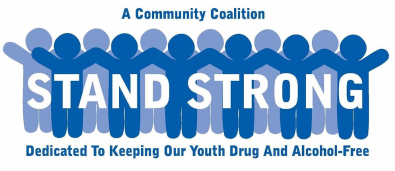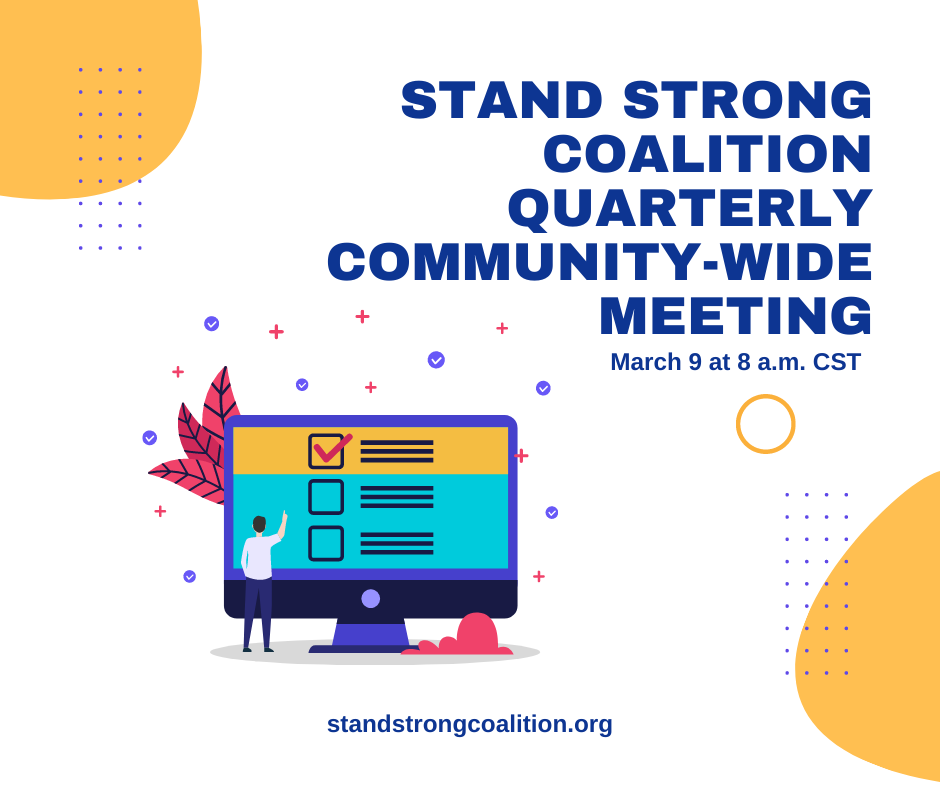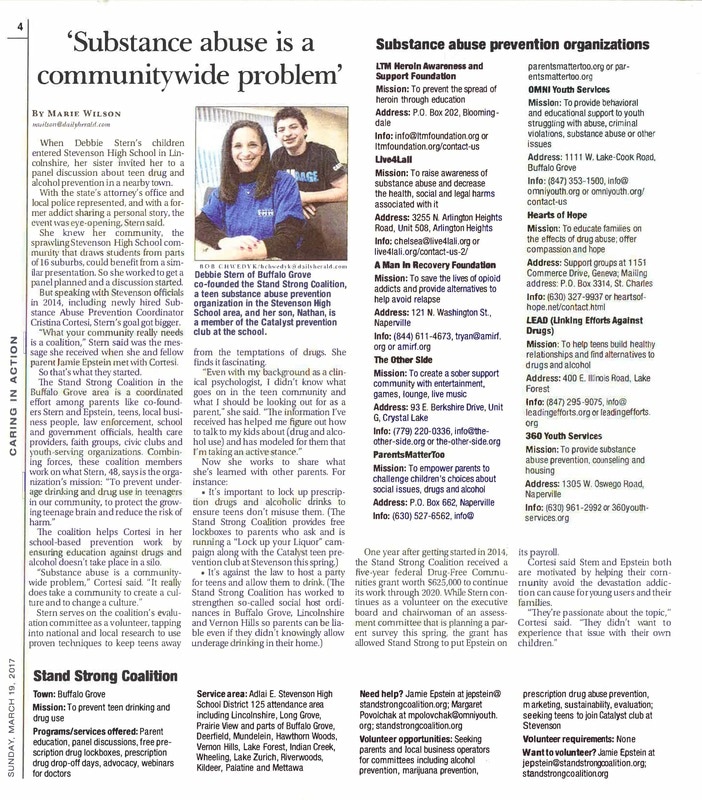WEBSITE UNDER CONSTRUCTION
UPDATES COMING AUGUST 2024
Upcoming EventsStand Strong Quarterly Meeting featuring 2022 Student Health and Wellness Survey DataDid you miss our quarterly meeting in March? Dr. Barker shared 2022 Student Health and Wellness Survey data from our community. Check out the recording here!
From the Experts: Helping Teens Cope Positively with Anxiety and Stress During COVID-19By Dr. Aaron Weiner
COVID-19 has been a hard hit to everyone’s mental health -- nerves are frayed, and anxiety and depression are higher than any time in recent memory. And although everyone’s world has turned upside-down in a matter of months, the argument could easily be made that our kids have had it even rougher than the rest of us. Why? Because instead of school being a consistent part of their lives, it was abruptly cancelled with no chance to tie off loose ends. And now it either will be an entirely different experience, either as remote learning, or with an undercurrent of fear and uncertainty about the implications of returning in-person as part of an entirely masked student body and staff. The school ecosystem was pretty much their entire world, their anchor point, and that world as they knew it suddenly disappeared. It was a nexus – the vehicle for their friends, stress, creativity, sports, personal development, crushes, emotional highs, emotional lows, and everything in-between. The ramifications of this are that students’ levels of stress are even higher than before (and even then they were already pretty high): students with collegiate aspirations have to wonder if they’ll be falling behind in-person peers, and those in-person peers have to face the daily stress of being in an indoor environment with hundreds of other people, not knowing if they might bring the virus back to their family, much less become infected themselves. Knowing how to deal with this stress effectively is essential, particularly because one of the primary reasons adolescents turn to substances is as an attempt to cope with internal pressures. This begs the question: as parents, what can we do to help ensure our kids remain emotionally healthy and drug-free during this challenging and unprecedented time? Although there are numerous factors outside of our control, here are some principles that will help steer you in the right direction. Stay connected If your child is beginning to use substances, multiple facets of their life start to change, such as their friends, their wardrobe, and their mood. That said – you won’t know if something has changed if you don’t know where they started. Make sure you take the time to stay connected, and take a genuine interest in their life. Be safe to talk to – about anything It’s critical that your child sees you as a confidant – someone they can talk to about their feelings and struggles. This doesn’t mean you don’t discipline or do your job as a parent, but it does mean that your child needs to feel respected and supported, even at times when they’ve earned a consequence due to their actions. If your child feels they’ll be better off not talking to you about their problems, particularly those related to substances, chances are higher that they will simply choose to keep it to themselves. Provide prosocial activities and peer groups Children want to become part of a social system; if they can’t find acceptance in prosocial channels, they may turn to others that have poor implications for their long-term success. This is a particularly difficult problem during COVID-19, when most prosocial peer activities are suspended. Given this, consider making additional efforts to integrate your child into a healthy family dynamic – share tasks and take on new household projects together. Also, consider bonding through diving into their interests – yes, even Minecraft and Fortnite are fair game. Help them develop healthy coping behaviors Given that many kids use substances to cope with stressors, it’s critical that we give them another effective option that they can use instead. Tried and true methods for healthy coping include meditation (try making this a daily family activity, using an instructional app like Headspace or Calm), talking through strong emotions, and exercise. Model these behaviors for your children, and they’re more likely to do them, too. And of course, if your child is having very significant concerns related to mental or behavioral health, don’t be afraid to reach out to a therapist – we have years of training in evidence-based approaches to help get your child on the right track. Reward positive behavior As parents, many of us have a bad habit of always noticing and responding to poor behavior, but not giving the same amount of attention to positive behavior. It’s critical we do this, however: rewarding and reinforcing behaviors we’d like our children to repeat is just as important, if not actually more important, than providing negative consequences for unwanted behaviors. Make sure to take time to celebrate your child for the things they’re doing right, and they’ll be more likely to do those things again. All this said, the most important aspect to keep in mind as we make our way through the summer and into the uncertainty this fall is that we, as parents, have to take care of ourselves in order to provide a stable and healthy home environment for our kids. Make sure you’re prioritizing take to take care of yourself, too – engaging in the healthy coping strategies mentioned above, or any others that recharge your batteries. We are both the engine and safety net for our family and kids – we have to be as solid as we can, or the rest of the system starts to shake and falter. So – go easy on yourself. Do your best, act with intention, and reach out to your supports. Your kids will notice it, appreciate it, and model it. Take care and be well, Aaron Weiner, PhD, ABPP Licensed Clinical Psychologist weinerphd.com Dr. Aaron Weiner is a licensed, board-certified psychologist and master addiction counselor. He is a clinician, author and frequent speaker on addiction treatment and issues. Dr. Weiner earned his doctorate from the University of Illinois at Urbana-Champaign and completed his fellowship in Addiction Psychology at the VA Ann Arbor Healthcare System. Stand Strong Coalition is honored to have Dr. Weiner serve on our Marijuana Committee. MEDIA: Substance Abuse is a Community-wide Problem"Substance abuse is a community-wide problem," said Dr. Cristina Cortesi, Substance Abuse Coordinator at Adlai E. Stevenson High School. "It really does take a community to create a culture and to change a culture."
"Even with my background as a clinical psychologist, I didn't know what goes on in the teen community and what I should be looking out for as a parent," Dr. Debbie Stern said. - Original article from Daily Herald's print section - Caring in Action by Staff Writer Marie Wilson dated March 19, 2017. |
Download our After-Party Parent Toolkit today!The Latest on Facebook |


